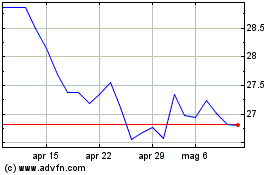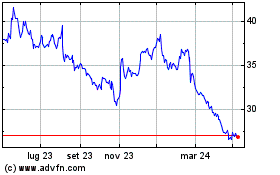Galapagos reports positive topline results with GLPG1205 in IPF
patients in PINTA Proof-of-Concept trial
- Placebo-adjusted improvement in forced vital capacity
(FVC) decline of 42mL across treatment groups at 26
weeks
- Correlation between FVC decline and pulmonary lobar
volume change observed, as measured by functional respiratory
imaging (FRI)
- GLPG1205 planned to progress to dose finding Phase 2b
study
Mechelen, Belgium; 30 November 2020,
22.01 CET; Galapagos NV (Euronext & NASDAQ: GLPG) announces
positive topline results with its investigational GPR84 antagonist
GLPG1205 in Proof-of-Concept Phase 2 trial in idiopathic pulmonary
fibrosis (IPF) patients.
The PINTA trial was a randomized, double-blind,
placebo-controlled trial investigating a 100mg once-daily oral dose
of GLPG1205. The study recruited and included a total of 68 IPF
patients. Participants were administered drug candidate or placebo
(2:1 randomization) for 26 weeks and could remain on their standard
of care as background therapy, i.e. nintedanib, pirfenidone or
neither. The primary objective of the trial was to assess the
change from baseline in FVC (in mL) over 26 weeks compared to
placebo. Other measures included safety, tolerability, time to
major events, changes in functional exercise capacity, quality of
life, pharmacokinetics, pharmacodynamics and FRI.
At week 26, patients receiving GLPG1205 on top
of standard of care showed a smaller FVC decline, with a difference
of 42mL versus placebo on top of standard of care (-76mL on
placebo; -34mL on treatment). The study was not powered to show
statistical significance. The FVC trend was consistent across the
three treatment strata. In addition, the change in pulmonary lobar
volume, as measured by FRI, correlates with the FVC decline
observed.
No relevant safety signals were observed for
GLPG1205 alone and on top of pirfenidone. The most frequently
reported adverse events on GLPG1205 alone were gastrointestinal
disorders, especially nausea. In the treatment arm of GLPG1205 on
top of nintedanib, a higher rate of early discontinuations and high
grade TEAEs were observed. In the arm of the study with GPLG1205 on
top of nintedanib, there was one death due to an exacerbation of
IPF, which was determined to be unrelated to study treatment.
Based on the results of this trial, Galapagos
plans to progress GLPG1205 in a dose finding Phase 2b trial.
The full results of the PINTA trial will be
submitted to a future medical conference and peer-reviewed medical
journals.
“Keeping in mind the limitations of this early
clinical study, the PINTA study with GLPG1205 is a positive trial.
The consistent changes observed across treatment strata, using
different analytical methods, including FRI, are very encouraging.
While we need to understand more about long-term tolerability of
the drug, the PINTA results warrant further
investigation,” said Prof. Dr. Toby Maher, Professor of
Medicine at Keck School of Medicine, University of Southern
California.
“We wish to thank participating patients and
physicians in the PINTA trial. We are pleased to see a second novel
mechanism of action from our innovative platform show early signs
of activity in IPF, a highly fatal disease for which improved
therapies are desperately needed. This additional novel mode of
action may complement the anti-fibrotic approaches within our
expanding IPF portfolio,” said Dr. Piet Wigerinck, Chief Scientific
Officer of Galapagos.
About GLPG1205 and the fibrosis
portfolioGLPG1205 is a small molecule selectively
functionally antagonizing GPR84. Galapagos identified the GPR84
target using its proprietary target discovery platform. GLPG1205
showed promising results in relevant pre-clinical models for IPF.
Galapagos currently has several drug candidates with distinct
mechanisms of action in its portfolio aimed at building a fibrosis
franchise, including ziritaxestat (GLPG1690, autotaxin inhibitor)
in the ISABELA Phase 3 program in IPF, ziritaxestat in the NOVESA
Phase 2 trial in systemic sclerosis, GLPG1205, GLPG4716 (chitinase
receptor inhibitor) preparing for Phase 2 in IPF, and GLPG4124 and
GLPG4586, currently in pre-clinical development.
GLPG1205 is investigational; its efficacy and
safety have not been evaluated by any regulatory
authority.Information about studies with GLPG1205:
www.clinicaltrials.govFor more information about GLPG1205:
www.glpg.com/ipf
About IPF
IPF is a chronic, relentlessly progressive
fibrotic disorder of the lungs that typically affects adults over
the age of 40. There are approximately 200,000 patients with IPF in
the U.S. and Europe. As such, IPF is considered a rare disease. The
clinical prognosis of patients with IPF is poor as the median
survival at diagnosis is around 3 years. Currently, no medical
therapies have been found to cure IPF. The medical treatment
strategy aims to slow the disease progression and improve the
quality of life.
About Galapagos
Galapagos (Euronext & NASDAQ: GLPG)
discovers and develops small molecule medicines with novel modes of
action, several of which show promising patient results and are
currently in late-stage development in multiple diseases. The
company’s pipeline comprises early discovery through to Phase 3
programs in inflammation, fibrosis, and other indications.
Galapagos’ ambition is to become a leading global biopharmaceutical
company focused on the discovery, development and commercialization
of innovative medicines. More information at www.glpg.com.
Contact
Investors:Elizabeth GoodwinVP Investor
Relations +1 781 460 1784
Sofie Van GijselSenior Director Investor Relations+32 485 19 14
15ir@glpg.com
Media:Carmen VroonenGlobal Head of
Communications & Public Affairs+32 473 824 874
Anna GibbinsSenior Director Therapeutic Areas Communications+44
7717 801900
communications@glpg.com
Forward-looking statements
This press release includes forward-looking
statements within the meaning of the Private Securities Litigation
Reform Act of 1995, as amended, that are subject to risks,
uncertainties and other factors that could cause actual results to
differ materially from those referred to in the forward-looking
statements and, therefore, the reader should not place undue
reliance on them. These risks, uncertainties and other factors
include, without limitation, the risk that ongoing and future
clinical studies with GLPG1205 and other drug candidates from
Galapagos’ fibrosis portfolio may not be completed in the currently
envisaged timelines or at all, the inherent uncertainties
associated with competitive developments, clinical trial and
product development activities and regulatory approval requirements
(including that data from the ongoing and planned clinical research
programs may not support registration or further development of
GLPG1205 and other drug candidates from Galapagos’ fibrosis
portfolio due to safety, efficacy or other reasons), Galapagos'
reliance on collaborations with third parties and that Galapagos’
estimations regarding its GLPG1205 and fibrosis portfolio
development program and regarding the commercial potential of
GLPG1205 and of other drug candidates from Galapagos’ fibrosis
portfolio, may be incorrect, as well as those risks and
uncertainties identified in our Annual Report on Form 20-F for the
year ended 31 December 2019 and our subsequent filings with the
SEC. All statements other than statements of historical fact are
statements that could be deemed forward-looking statements. The
forward-looking statements contained herein are based on
management’s current expectations and beliefs and speak only as of
the date hereof, and Galapagos makes no commitment to update or
publicly release any revisions to forward-looking statements in
order to reflect new information or subsequent events,
circumstances or changes in expectations.
- Galapagos reports positive topline results with GLPG1205 in IPF
patients in PINTA Proof-of-Concept trial
Grafico Azioni Galapagos (EU:GLPG)
Storico
Da Mar 2024 a Apr 2024

Grafico Azioni Galapagos (EU:GLPG)
Storico
Da Apr 2023 a Apr 2024
